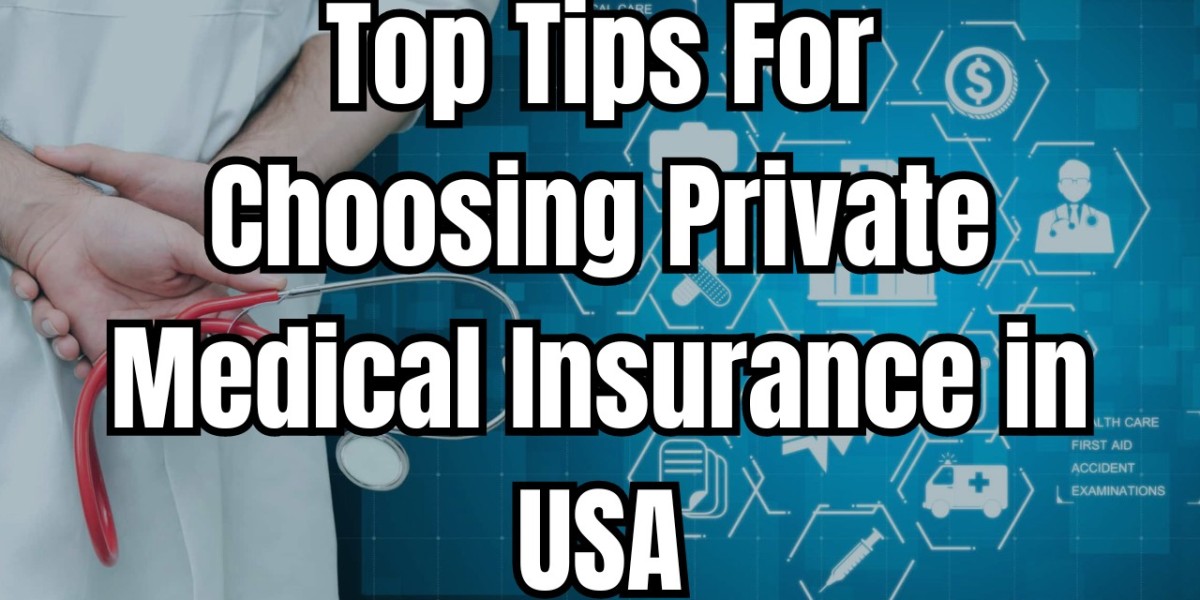The private medical insurance sector in the United States offers an extensive variety of options. However, with all the complexities it contains, People who are acquiring it face challenges in choosing the most suitable medical insurance on their own.
Choosing the right plan that meets requirements is not difficult at all. All you have to do is carefully assess the various factors that a health insurance plan includes. Are you someone who is finding it difficult to make the right choice? Don't worry, since we are going to help you navigate this process. Read till the end to know some top tips for choosing the best private Health insurance in the USA.
Understand Your Health Care Needs Before Choosing Private Medical insurance

The first and most important step in finding appropriate private medical insurance is to recognize and analyze one's own health-care needs. Before going into the available possibilities, you should assess your individual health-care needs. You can ask yourself the following questions:
Do you visit the doctor frequently?
Are you managing any chronic conditions that require regular treatment or medication?
Do you have any planned surgeries or significant medical procedures coming up?
Are mental health services or maternity care part of your health care needs?
All these questions mentioned above will assist in understanding your medical needs which will result in selecting a plan that offers enough coverage. For example, if you often visit specialists or need prescription medicines, you should check that your insurance plan provides enough coverage in those areas.
Assess Different Plan Types
Before making a selection, it is generally recommended to do an extensive evaluation of all types. There are several types of private health insurance plans and it is essential for you to understand the advantages and structure of each before choosing one. Below are some of them stated:
Health Maintenance Organization
This plan is known as HMO, in short. It is relatively cheaper than other plans. However, passing through a doctor within their network to access a specialist is a must and it also requires a referral from your primary doctor to go to a specialist.
Preferred Provider Organization
These often have more flexibility in choosing doctors and specialists, including out-of-network providers, but with higher premium costs.
Exclusive Provider Organization (EPO)
It is a mix of both HMO and PPO. The one where you do not need a recommendation to see a specialist, but your options are restricted to in-network providers.
Point of Service (POS)
let you see out-of-network doctors, but they frequently need a referral for specialist appointments.
Consider Premiums, deductibles, and out-of-pocket costs.
Comprehension of the costs of your plan in private health insurance forms the core of such cover. Typically, there are three common aspects that health insurance encompasses:
Premium
It is the regular monthly payments made to keep your insurance cover active. Mostly, lesser premiums attract higher out-of-pocket charges.
Deductible
This refers to the amount that one has to pay for any medical service one receives before your insurance pays the cost of it. The higher the deductibles are charged, the lower the premiums are charged. This is because one pays a very heavy front charge when care is required.
Out-of-Pocket Maximum
The maximum amount you will spend on coverķed services in a given year. Once your insurance is out of this point, they will start covering 100% for the rest of that year.
When selecting a plan, weigh low premium cost against out-of-pocket charges. A low premium is often appealing, but many people have found those who seriously are ill and need to see their doctor leave with little or nothing when low premiums, high deductibles, and high out-of-pocket limits add up.
Check The Provider Network
Every private medical insurance plan works with a network of doctors, hospitals, and other healthcare providers. Therefore, it’s crucial to make sure your preferred doctors, specialists, or facilities are included in your plan’s network. If they’re not, you could end up paying higher costs for out-of-network care.
Furthermore, confirm with your insurer if you have providers whom you prefer or whom you would want to stay in; normally, specific providers do not want their clients to change, and you would want to know the network coverage, such as its reach in a geographical area. If you travel frequently, you might want to look for a plan that has a national network so you'll be covered even if you're outside of your home state.
Evaluate Prescription Drug coverage

If you take prescription medications regularly, checking out a plan's drug coverage is a must. What will be covered may differ from plan to plan, and the cost difference can be dramatic depending on your insurer's formulary, or listed covered drugs.
Make sure to check if your drugs are on the formulary of the plan you are comparing and investigate the co-pays or co-insurance applied to each. Some insurance plans have prior authorization or step therapy for certain drugs, so you require the provider's permission from the insurer before it is covered. Some of these subtleties can mean avoiding a surprise at the pharmacy.
Consider Additional Benefits
In addition to prescription drug coverage, one must also consider additional benefits. Most of the private health insurance policies have added benefits that could come in handy at specific points in your health and lifestyle. These include:
Vision and Dental Benefits: Many policies offer various vision and dental services as part of the package, or may even be available as add-ons.
Wellness Benefits: Policies may include wellness benefits such as membership discount at the gym, discount programs on weight loss, smoking cessation, etc.
Telemedicine services: With virtual care, you can save hours and money on non-emergency consults.
Psychological services: Should you be concerned about mental health care, find a policy that includes counseling and/or therapy services.
These can be huge added values to your plan, and they must therefore be considered in your decision. These additional benefits can significantly increase the value of your plan and should be considered during the decision-making process. It is a plus if the Documents such as telehealth consultation notes or wellness program information are stored in editable PDFs, as it will help you keep track of the benefits you've used.
Review Customer Service Process and Claims
The best factor that you would like to have in your insurance plan is the reliable customer service and how easy the process of claims is, especially at stressful times when you need health care. Check the reputation of the insurance company with the following:
- Customer satisfaction: This can be seen in online reviews or consumer ratings for which existing customers rate the service of the company.
Ease of claims: Try to understand the process involved in claims - do they involve simple steps and few documents, or will you have to wade through reams of paperwork to get reimbursed?
Response time: How fast does the insurer take to process claims or reply to the questions of their customers?
You can also inquire with the insurance firm's customer care department in case you want to ask any questions ahead of signing up. This will give you an idea as to whether they would be helpful and responsive.
Compare Plans With Marketplaces
The best way to compare plans is through the federal or state health insurance marketplace. As with these you will be able to compare plans side-by-side, allowing you to easily compare costs, coverage, and other important details.
Notably, these marketplaces also offer subsidies based on your income level, which could lower the cost for premiums. Even if you don't qualify for a subsidy, the marketplace may be a resource to use in comparing plans available in your area.
Check for Coverage of Preventive services

Besides, comparing plans should also keep a check on preventive services. This is because many private medical insurance plans, as dictated by law, cover preventive services without a dime coming from your pocket. Just imagine these services: screenings, immunizations, annual checkups, and more. Furthermore, make sure that your plan has complete preventive care coverage to save you money and help keep you healthy, too.
Policy Renewal and Changes
Insurance policies can change the scope of coverage, fees, and networks annually, so it's really important to read the policy when it's up for renewal. Some get quite comfortable with their plan to such an extent that they do not even realize certain benefits or coverage changed. Your yearly review of your policy will enable you to avoid nasty surprises when you need to see a healthcare professional.
Final Thoughts
Choosing the right private medical insurance is purely a balance of your needs for health care against how much you can afford. Having knowledge of the essential provisions, plan types, costs, provider networks, and other benefits makes choosing the best fit much easier. Start exploring the best insurance options that fit your health needs today!










